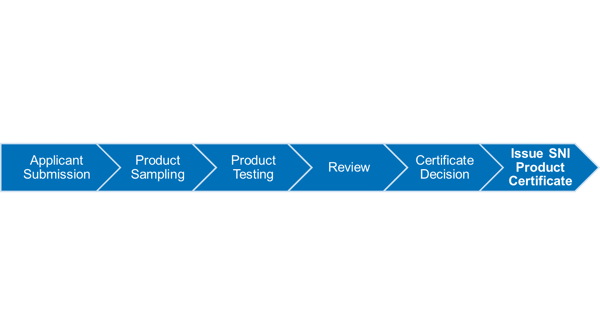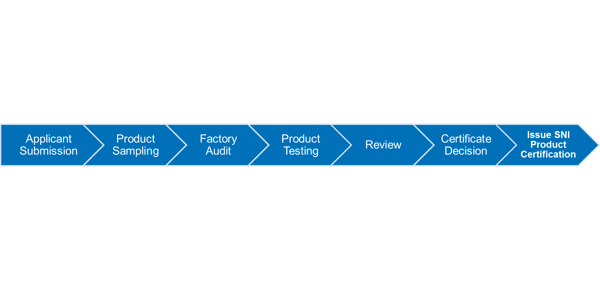Author credit: LFM (Expert for SNI product approval) Mr. Rachmat Kurniawan
As the largest economy in Southeast Asia, Indonesia (a member of G20), comprises of approximately seventeen thousand islands lying along the equator. The main contributors to its bustling economy are the manufacturing and processing sectors, which rake in around 24.3% for the Gross Domestic Product (GDP) of Indonesia. Some of the major industries that fall under these sectors are food and beverage, machinery and transportation, chemical, and textile.
 With such a populous country, a wide range of investment opportunities, and an influx of products to regulate, the SNI (Indonesian National Standard) approval process plays a very important role in determining product safety. Its creation was designed to meet the WTO Code of Good Practice which consists of openness, transparency, consensus and impartiality, effectiveness and relevance, coherence, and development.
With such a populous country, a wide range of investment opportunities, and an influx of products to regulate, the SNI (Indonesian National Standard) approval process plays a very important role in determining product safety. Its creation was designed to meet the WTO Code of Good Practice which consists of openness, transparency, consensus and impartiality, effectiveness and relevance, coherence, and development.The affixing of the SNI mark on any product/service is an indication that it meets the standard requirements to allow the product to be sold in Indonesia. To this end, related ministries determine which products require a mandatory SNI license.
There are typically two types of SNI licenses in Indonesia: mandatory and voluntary. For products that have been regulated by related ministries as SNI mandatory, SNI certification must be completed before the products can be imported or sold in the country. In 2018 alone, there were 197 SNI mandatory products.
How to apply for SNI Product Approval?
To obtain SNI product approval, a manufacturer or importer must undergo conformity factory assessment and product testing. Product Certification Body handles those processes.
Only Product Certification Bodies that have been accredited by KAN and assigned by related ministries have the right to perform SNI certification processes or issue the SNI certificate. TÜV Rheinland Indonesia (LsPr-026-IDN) is qualified to deliver 104 type of products: Food & beverage, rubber and plastics, electro-technical, telecommunication and optical products, Non-electric household, sports and entertainment equipment, etc.
Here are the three steps for acquiring SNI approval:
Step 1: ApplicationCompany or applicant applies to TÜV Rheinland Indonesia with necessary supporting documentation of application form, order confirmation and questionnaire, along with copies of:
• Legal notary act of company (applicant)
• Trade mark registration or certificate issued by Directorate General of Intellectual Property in Indonesia
• Valid ISO 9001 certificate or equivalent
• Quality manual & QC flowchart
TÜV Rheinland Indonesia performs the adequacy review of the application prior to the next step of evaluation.
Step 2: Evaluation
Initial on-site factory inspection including quality system audit and technical audit by TÜV Rheinland Indonesia at your factory premises. In this phase, authorized personnel also conduct the drawing of samples for testing purposes in our laboratory or partner laboratories.
Random samples of products taken from the manufacturer and/or market for surveillance testing purposes.
The Technical review team then reviews the technical reports which include the on-site factory audit report, laboratory test report, and other technical and supporting documentations prior to the next step.
Step 3: Decision LSPro (Product Certification Body)
Once a company is able to prove that its products comply with requirements of the respective SNI standard and certification procedures, LSPro (Product Certification Body) TÜV Rheinland Indonesia will issue a certificate or SPPT SNI (Product Certificate for the Use of SNI Signs).
SNI Approval Scheme:
To conduct the SNI product certification process, LSPro (Product Certification Body) should employ the certification scheme based on types of products. The scheme entails the procedures, requirements and mechanisms needed to implement certain product certifications. The process flow is usually: selection, determination, review, decision, and finally attestation.
There are two SNI product certification schemes to take note of -- see diagrams below:
Type 1b

For further clarifications on the SNI approval process, please drop us a note and we will get back to you soon.


